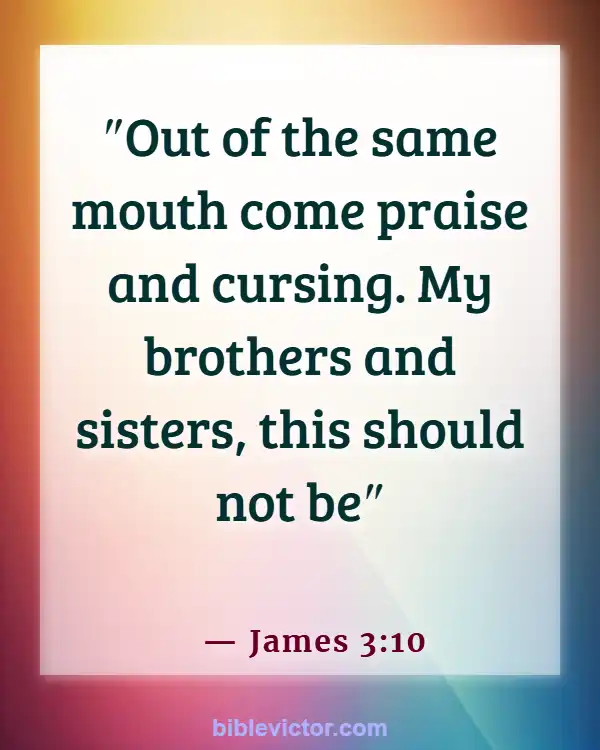Friends, if you’re searching for Bible verses about bad language, this content is for you. Today, I share Bible verses that can really help you better understand the topic according to the Bible. These scriptures shed light on the importance of our words and the impact of inappropriate speech. Let’s explore what the Word says about controlling our tongues and using language that honors God and uplifts others.
Contents
- 1 What Does the Bible Say About Profanity and Cursing?
- 2 How to Guard Your Tongue: Biblical Wisdom on Speech
- 2.1 Proverbs 21:23 – Guard your tongue, avoid trouble
- 2.2 James 1:26 – Control speech to avoid self-deception
- 2.3 Psalm 141:3 – Guard my speech, Lord
- 2.4 Proverbs 13:3 – Guard your words, protect life
- 2.5 Proverbs 10:19 – Restrain words to avoid sin
- 2.6 Ecclesiastes 5:2 – Speak thoughtfully before God
- 2.7 1 Peter 3:10 – Speak truth, seek peace diligently
- 3 The Power of Words: Scriptures on the Impact of Language
- 4 Overcoming Bad Language Habits: Bible-Based Strategies
- 5 Teaching Children About Clean Speech: Biblical Guidance
- 5.1 Proverbs 22:6 – Train children in righteous speech
- 5.2 Deuteronomy 6:6-7 – Teach children diligently
- 5.3 Colossians 3:16 – Let Christ’s message dwell richly
- 5.4 Proverbs 20:11 – Actions reveal true character
- 5.5 Psalm 34:13 – Keep your tongue from evil
- 5.6 Ephesians 6:4 – Raise children with godly discipline
- 6 Is All Swearing Sinful? Exploring Biblical Perspectives
What Does the Bible Say About Profanity and Cursing?
We all know the weight words can carry. The Bible guides us to use language that uplifts and encourages rather than tears down. Profanity and cursing aren’t just about harsh words; they reflect what’s in our hearts. By choosing our words wisely, we’re choosing to spread love and grace, echoing the kindness and patience that God shows us every day.
Ephesians 4:29 – Speak words that uplift others

Do not let any unwholesome talk come out of your mouths, but only what is helpful for building others up according to their needs, that it may benefit those who listen
Ephesians 4:29
Ephesians 4:29 encourages believers to use language that uplifts and benefits others, avoiding profane or harmful words. This verse highlights the importance of speaking with kindness and grace, reflecting one’s faith through positive communication.
Colossians 3:8 – Put off abusive language

But now you must also rid yourselves of all such things as these: anger, rage, malice, slander, filthy language from your lips
Colossians 3:8
Colossians 3:8 encourages believers to discard abusive and profane language, highlighting the importance of speech that reflects Christian values. It calls for a transformation in communication, promoting kindness and respect in alignment with a renewed life.
Proverbs 4:24 – Avoid corrupt and perverse speech
Keep your mouth free of perversity;
keep corrupt talk far from your lipsProverbs 4:24
Proverbs 4:24 advises steering clear of corrupt and perverse speech, highlighting the importance of maintaining purity in our words. It underscores the Bible’s call to avoid profanity and cursing, promoting integrity and respect in communication.
James 3:10 – Blessings and curses from tongue

Out of the same mouth come praise cursing. My brothers sisters, this should not be
James 3:10
James 3:10 highlights the contradiction of using the same tongue for both blessings and cursing. It serves as a reminder to be mindful of our speech, emphasizing the importance of purity and consistency in our words.
Matthew 15:11 – Words reflect the heart’s impurity

What goes into someone’s mouth does not defile them, but what comes out of their mouth, that is what defiles them.”
Matthew 15:11
Matthew 15:11 teaches that it’s not what enters the mouth that defiles a person, but what comes out. This underscores how words reflect inner purity or impurity, highlighting the importance of speaking with integrity and grace.
Proverbs 15:4 – Gentle words bring life

The soothing tongue is a tree of life,
but a perverse tongue crushes the spiritProverbs 15:4
Proverbs 15:4 emphasizes the power of gentle words, highlighting their ability to heal and bring life. In contrast, harsh or profane language can harm and wound, underscoring the importance of speaking with kindness and wisdom.
How to Guard Your Tongue: Biblical Wisdom on Speech
Guarding our tongue is all about being mindful and intentional with what we say. The Bible offers wisdom to help us speak with grace and truth. It’s like having a filter that helps you reflect God’s love in everyday conversations. By following this biblical wisdom, we learn to speak in ways that build others up and bring peace into our interactions.
Proverbs 21:23 – Guard your tongue, avoid trouble
Those who guard their mouths their tongues
keep themselves from calamityProverbs 21:23
Proverbs 21:23 emphasizes the importance of controlling one’s speech to prevent unnecessary conflicts. By guarding our words, we demonstrate wisdom and avoid troubles that can arise from careless or harmful language.
James 1:26 – Control speech to avoid self-deception

Those who consider themselves religious yet do not keep a tight rein on their tongues deceive themselves, their religion is worthless
James 1:26
James 1:26 emphasizes the importance of controlling one’s speech. It warns that failing to do so can lead to self-deception, highlighting that true religious practice involves mindful and respectful communication.
Psalm 141:3 – Guard my speech, Lord
Set a guard over my mouth, Lord ;
keep watch over the door of my lipsPsalm 141:3
Psalm 141:3 serves as a prayerful request for God’s guidance in controlling one’s speech. It emphasizes the importance of guarding our words, seeking divine help to ensure our language is respectful and uplifting, avoiding harm and negativity.
Proverbs 13:3 – Guard your words, protect life

Those who guard their lips preserve their lives,
but those who speak rashly will come to ruinProverbs 13:3
Proverbs 13:3 emphasizes the importance of mindful speech. By guarding our words, we protect ourselves and others, promoting life and harmony. This verse encourages thoughtful communication as a means to avoid unnecessary conflict and harm.
Proverbs 10:19 – Restrain words to avoid sin

Sin is not ended by multiplying words,
but the prudent hold their tonguesProverbs 10:19
Proverbs 10:19 highlights the importance of mindful speech, warning that excessive talking often leads to sin. By choosing our words carefully and speaking less, we can avoid unnecessary trouble and reflect wisdom and self-control.
Ecclesiastes 5:2 – Speak thoughtfully before God
Do not be quick with your mouth,
do not be hasty in your heart
to utter anything before God.
God is in heaven
you are on earth,
so let your words be fewEcclesiastes 5:2
Ecclesiastes 5:2 encourages mindful speech, urging us to be cautious and deliberate with our words before God. It highlights the importance of thoughtful communication and underscores the wisdom of speaking with reverence and intention.
1 Peter 3:10 – Speak truth, seek peace diligently

For“Whoever would love life
see good days
must keep their tongue from evil
their lips from deceitful speech1 Peter 3:10
1 Peter 3:10 emphasizes the importance of controlling one’s speech, encouraging believers to speak truthfully and pursue peace. It reminds us that guarding our tongue is essential for living a righteous and harmonious life.
The Power of Words: Scriptures on the Impact of Language
Words have a profound impact on those around us. They can heal or hurt, uplift or bring down. The Bible reminds us that our language holds power, and we should use it to reflect God’s love and wisdom. By speaking life into others, we can bring about positive change and strengthen our relationships.
Proverbs 18:21 – Life and death in words

The tongue has the power of life death,
those who love it will eat its fruitProverbs 18:21
Proverbs 18:21 emphasizes the profound impact of our words, highlighting that they hold the power to bring life or death. This verse underscores the responsibility to choose words wisely, as they can uplift or harm others.
James 3:5 – Tongue’s power in small size
Likewise, the tongue is a small part of the body, but it makes great boasts. Consider what a great forest is set on fire by a small spark
James 3:5
James 3:5 highlights the tongue’s power despite its small size, emphasizing how our words, like a tiny spark, can have a significant impact, either constructive or destructive, illustrating the profound influence of language in our lives.
Proverbs 16:24 – Kind words bring healing

Gracious words are a honeycomb,
sweet to the soul healing to the bonesProverbs 16:24
Proverbs 16:24 highlights the transformative power of kind words, emphasizing their ability to bring healing and positivity. This verse reminds us that our language can profoundly impact others, promoting healing and harmony over negativity.
Matthew 12:36 – Account for every careless word

But I tell you that everyone will have to give account on the day of judgment for every empty word they have spoken
Matthew 12:36
Matthew 12:36 emphasizes the significance of our words, warning that we will be held accountable for every careless remark. It underscores the power and impact of language, urging mindful and responsible speech.
Proverbs 12:18 – Words can harm or heal

The words of the reckless pierce like swords,
but the tongue of the wise brings healingProverbs 12:18
Proverbs 12:18 highlights the dual power of words: they can wound like a sword or heal like a balm. This verse emphasizes the importance of choosing our language wisely to foster healing and understanding.
Proverbs 25:11 – Words fitly spoken are precious
Like apples of gold in settings of silver
is a ruling rightly givenProverbs 25:11
Proverbs 25:11 highlights the value of well-chosen words, comparing them to “apples of gold in settings of silver.” This verse emphasizes how thoughtful language can positively impact others, underscoring the importance of speaking with care and wisdom.
Overcoming Bad Language Habits: Bible-Based Strategies
Breaking the habit of using bad language takes effort and intention. The Bible encourages us to transform our speech by filling our hearts with God’s truth. By surrounding ourselves with uplifting influences and seeking God’s help, we can replace negative speech with words that encourage and build up others.
Romans 12:2 – Transform through renewed mind

Do not conform to the pattern of this world, but be transformed by the renewing of your mind. Then you will be able to test approve what God’s will is—his good, pleasing perfect will
Romans 12:2
Romans 12:2 encourages believers to transform their lives by renewing their minds, allowing them to discern and embody God’s will. This transformation helps overcome negative habits, including bad language, by aligning thoughts and actions with divine principles.
Philippians 4:8 – Think on virtuous things

Finally, brothers sisters, whatever is true, whatever is noble, whatever is right, whatever is pure, whatever is lovely, whatever is admirable—if anything is excellent or praiseworthy—think about such things
Philippians 4:8
Philippians 4:8 encourages us to focus on things that are true, noble, right, pure, lovely, and admirable. By filling our minds with virtuous thoughts, we can transform our speech and overcome habits of using bad language.
Colossians 4:6 – Speak graciously and wisely

Let your conversation be always full of grace, seasoned with salt, so that you may know how to answer everyone
Colossians 4:6
Colossians 4:6 encourages speaking with grace and wisdom, emphasizing the importance of thoughtful and kind communication. Overcoming bad language habits involves aligning our speech with these principles, fostering positive and respectful interactions.
James 3:8 – Taming the tongue is difficult
But no human being can tame the tongue. It is a restless evil, full of deadly poison
James 3:8
James 3:8 emphasizes the challenge of controlling our speech, highlighting the tongue’s unruly nature. Overcoming bad language requires conscious effort and spiritual discipline, as the tongue can be a source of both harm and blessing.
Ephesians 5:4 – Avoid obscene or foolish talk

Nor should there be obscenity, foolish talk or coarse joking, which are out of place, but rather thanksgiving
Ephesians 5:4
Ephesians 5:4 advises against using obscene or foolish language, encouraging believers to replace such speech with gratitude. This verse emphasizes the importance of maintaining purity in our words as part of a Christ-centered life.
1 Corinthians 15:33 – Bad company corrupts good character

Do not be misled: “Bad company corrupts good character.”
1 Corinthians 15:33
1 Corinthians 15:33 warns that negative influences can lead to the deterioration of one’s character. To overcome bad language habits, surround yourself with positive influences and immerse in Scripture to cultivate virtuous speech.
Teaching Children About Clean Speech: Biblical Guidance
As we guide our children, teaching them about clean speech is essential. The Bible provides a foundation for showing them the value of kind and thoughtful language. By modeling and discussing the impact of words, we help them grow into compassionate individuals who speak with love and respect.
Proverbs 22:6 – Train children in righteous speech

Start children off on the way they should go,
even when they are old they will not turn from itProverbs 22:6
Proverbs 22:6 emphasizes the importance of guiding children in righteous ways, including their speech. By instilling values of clean and respectful language early on, we set a foundation for moral and ethical behavior throughout their lives.
Deuteronomy 6:6-7 – Teach children diligently

These commandments that I give you today are to be on your hearts. Impress them on your children. Talk about them when you sit at home when you walk along the road, when you lie down when you get up
Deuteronomy 6:6-7
Deuteronomy 6:6-7 emphasizes the importance of instilling God’s commandments in children. By teaching them diligently, parents can guide their children toward using language that reflects biblical values, fostering clean and respectful speech.
Colossians 3:16 – Let Christ’s message dwell richly

Let the message of Christ dwell among you richly as you teach admonish one another with all wisdom through psalms, hymns, songs from the Spirit, singing to God with gratitude in your hearts
Colossians 3:16
Colossians 3:16 encourages letting Christ’s teachings fill our hearts, guiding us to use language that reflects His wisdom and love. Teaching children clean speech involves embracing and sharing His message in our words and actions.
Proverbs 20:11 – Actions reveal true character

Even small children are known by their actions,
so is their conduct really pure upright?Proverbs 20:11
Proverbs 20:11 emphasizes that even children are known by their actions, highlighting the importance of teaching them to use clean speech. This verse underscores how words and deeds reflect one’s true character and integrity.
Psalm 34:13 – Keep your tongue from evil
Keep your tongue from evil
your lips from telling liesPsalm 34:13
Psalm 34:13 encourages us to teach children the importance of clean speech by instructing them to refrain from using harmful or deceitful words. This verse underscores the value of cultivating integrity and kindness in communication.
Ephesians 6:4 – Raise children with godly discipline

Fathers, do not exasperate your children; instead, bring them up in the training instruction of the Lord
Ephesians 6:4
Ephesians 6:4 encourages parents to raise their children with godly discipline and instruction. It emphasizes nurturing them in a way that fosters respect and clean speech, guiding them away from negative influences and harmful language.
Is All Swearing Sinful? Exploring Biblical Perspectives
The Bible offers insight into the nature of swearing and its impact on our spiritual lives. It’s not just about specific words but the intent behind them. By seeking God’s wisdom and understanding, we gain clarity on how to align our speech with our faith, ensuring our words reflect the love and holiness we’re called to live by.
Matthew 5:34 – Do not swear at all
But I tell you, do not swear an oath at all: either by heaven, for it is God’s throne
Matthew 5:34
Matthew 5:34 advises against swearing oaths, emphasizing honesty and integrity. This verse suggests that one’s word should be trustworthy without needing additional affirmations, promoting straightforward communication and aligning with Biblical teachings on truthful speech.
James 5:12 – Avoid swearing, speak truthfully

Above all, my brothers sisters, do not swear—not by heaven or by earth or by anything else. All you need to say is a simple “Yes” or “No.” Otherwise you will be condemned
James 5:12
James 5:12 urges believers to avoid swearing oaths and instead speak truthfully and plainly. It emphasizes integrity in communication, reminding us that our words should reflect honesty and sincerity without the need for excessive promises.
Exodus 20:7 – Respect God’s name, no misuse

“You shall not misuse the name of the Lord your God, for the Lord will not hold anyone guiltless who misuses his name
Exodus 20:7
Exodus 20:7 emphasizes the importance of respecting God’s name, warning against its misuse. This verse highlights the sacredness of God’s name, suggesting that using it carelessly or disrespectfully is sinful and dishonors the divine.
Colossians 3:17 – Do all in Jesus’ name

Whatever you do, whether in word or deed, do it all in the name of the Lord Jesus, giving thanks to God the Father through him
Colossians 3:17
Colossians 3:17 encourages believers to do everything in the name of Jesus, promoting actions and words that reflect His character. This implies avoiding bad language, as our speech should honor Him and align with His teachings.
Leviticus 19:12 – Do not swear falsely by God
“‘Do not swear falsely by my name so profane the name of your God. I am the Lord
Leviticus 19:12
Leviticus 19:12 warns against swearing falsely by God’s name, emphasizing the importance of honesty and reverence. It highlights the seriousness of using God’s name in oaths, reminding believers to uphold truth and integrity.
Psalm 19:14 – Words and thoughts be pleasing
May these words of my mouth this meditation of my heart
be pleasing in your sight,
Lord , my Rock my RedeemerPsalm 19:14
Psalm 19:14 encourages believers to ensure their words and thoughts are pleasing to God. It suggests that mindful speech and inner reflection align with divine standards, raising questions about the morality of swearing and language use.


